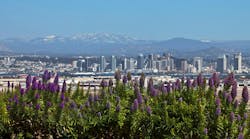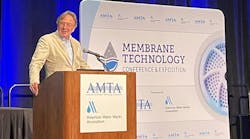ANN ARBOR, MI, Oct. 28, 2010 -- NSF International verifies Big Fish Environmental LLC's septage and high strength wastewater processing system to help address complex water quality issues.
Operated by NSF in cooperation with the U.S. EPA Office of Research and Development, the Environmental Technology Verification (ETV) Water Quality Protection Center evaluates and verifies a system's ability to remove contaminants to protect ground and surface waters. It also verifies a facility's operation and maintenance performance.
Waste from septic tanks and other high strength sources present a major operational issue for municipal wastewater treatment plants. The high organic, solid, and nutrient waste strength from septage may negatively affect ground and surface waters if discharged or disposed untreated, or may cause operating problems if treated at a wastewater treatment plant. Big Fish Environmental's system offers a solution, as verified by NSF International under the U.S. Environmental Protection Agency (EPA) ETV Program's Water Quality Protection Center.
NSF/ETV's evaluation of the Big Fish System documented the performance level that the system attained in processing septage and high strength wastewater during a 13-month verification test performed at the Big Fish facility in Charlevoix, Michigan. During the verification, Big Fish's treatment system received septage from residential and commercial septic tanks, portable toilet waste, fruit processing waste, municipal wastewater treatment plant secondary sludge, and commercial wastes containing fats, oils and grease (FOG). The operating parameters measured during the study included: pH, temperature, waste volumes, energy consumption, operating labor and others to provide a comprehensive assessment of the system.
Reductions in contaminant loads were evaluated to determine the effectiveness of the system to remove total suspended solids (TSS), organic wastes (as indicated by the biochemical oxygen demand - BOD), FOG, and nutrients (phosphorus and nitrogen). Effluent from the system meets requirements for discharge to the City of Charlevoix's Wastewater Treatment Plant (WWTP). NSF's ETV program also evaluated the system's capability to produce exceptional quality (EQ) Class A Biosolids (in accordance with federal regulations contained in 40 CFR Part 503), which can be used for agricultural (fertilizer) or home garden use to stimulate plant growth.
The NSF/ETV program verified the Big Fish System achieved greater than 95% reduction of influent BOD, phosphorus, TSS and FOG, resulting in a discharge to the Charlevoix WWTP of wastewater with characteristics less concentrated than typical domestic wastewater. The results also support that the system produces EQ Class A Biosolids.
"The system provides a viable technical solution to the pervasive problem of septage treatment at wastewater treatment plants," said Tom Stevens, NSF Water Quality Protection Center Manager. "The Big Fish System demonstrated effective treatment of septage and high strength wastewaters, making it easily treatable at a wastewater treatment plant, and making beneficial and sustainable use of recovered biosolids."
"We have reached our development goal with the help of the City, Township, and County of Charlevoix's Officials and Staff. The Michigan Department of Natural Resources and Environment and the EPA have provided an opportunity to achieve our goal of 'Life Cycle' product(s). As reported, low capital cost and low operation cost are an additional benefit of Big Fish. Our next goal is to meet ground water discharge of the Big Fish Effluent," said John W. Campbell, Originator of Big Fish Environmental, LLC.
Details of the results are included in the final report, which can be found at www.epa.gov/etv
About NSF International
NSF International, an independent, not-for-profit organization, certifies products and writes standards for food, water and consumer goods to minimize adverse health effects and protect the environment (www.nsf.org ). Founded in 1944, NSF is committed to protecting public health and safety worldwide and operates in more than 120 countries. NSF is a World Health Organization Collaborating Centre for Food and Water Safety and Indoor Environment.
EPA's Environmental Technology Verification Water Quality Protection Center, managed by NSF International, verifies commercial-ready technologies that protect ground- and surface waters from contamination. Third-party evaluation of technologies, following technically-sound test procedures, appropriate quality assurance/quality control and a managed process, provides credible data for purchasers, specifiers, and permitters to aid them in decisions regarding the use of the technology.
Additional NSF services include Education and Training, safety audits for the food and water industries, dietary and nutritional supplement certification, and management systems registrations (e.g. ISO 14001) delivered through NSF International Strategic Registrations, Ltd.
###


